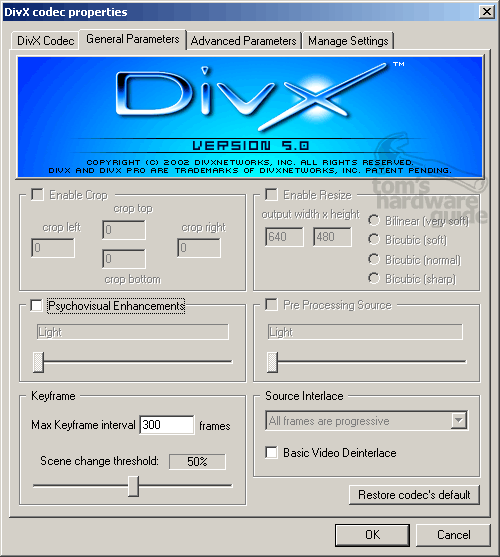DivX 5.0: From T-shirt To Dress Suit
Tools For Analog Material: Pre-processing And Source Interlace
Pre-processing and source interlace can be used with analog material that was later digitized. With high-quality digital videos (DVD, DVB, digital camera), it is not necessary. Digital technology is not yet as advanced in the United States as it is in Europe. In Europe, digital television (digital video broadcasting) has been a widespread reality for a long time. Astra, the pan-European satellite, provides digital television programming according to the DVB-S standard. Large European metropolitan areas receive the complete analog range in digital (DVB-C), as well. Even terrestrial digital television via antenna (DVB-T) is already being broadcast. The transmitted data have a high quality, because they are transmitted via an MPEG-2 transport stream. It should be noted that one could also receive television programming in full DVD quality everywhere. In North America at the moment, only customers in major cities enjoy access to digital programming.
That is why pre-processing and source interlace are an acceptable compromise for digitally captured analog videos. The first feature named will digitally reduce annoying effects such as specks, snow or hair.
The progressive format is best of all for video playback on a PC, as long as it is a purely digital source, such as DVD/MPEG-2, DV or DVB. If there is a recording from NTSC or PAL television programming, zigzags will occur on some lines of the image. That is a remnant from the analog age. These zigzags can be eliminated with the de-interlacing function. Telecine is a process that is used in the United States when transferring a feature film with 24 fps to the analog NTSC format (30fps). To compensate for the differences between the 24 fps and the 30 fps, some images must be inserted twice. The inverse telecine function removes these double images and increases efficiency in the encoding process.
In the standard version of DivX 5, the modes for pre-processing are missing.
Get Tom's Hardware's best news and in-depth reviews, straight to your inbox.
Current page: Tools For Analog Material: Pre-processing And Source Interlace
Prev Page Flow Heater: 1-pass And 2-pass Next Page Advanced Parameters: Something New From Something Old
